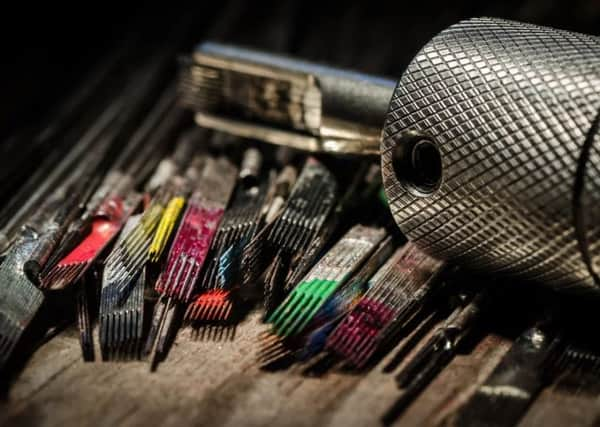'˜Pocket money' tattooists endangering kids


Unlicensed tattooists, known as scratchers, use cheap equipment bought online to offer makeshift tattoos inked in kitchens and gardens.
They often target children and adults with their low prices, council leaders from the Local Government Association said.
Advertisement
Hide AdAdvertisement
Hide AdYet apart from being left with a permanent badly drawn inking, these illegal tattooists risk spreading diseases including HIV and hepatitis because of the dirty equipment they use.
Fuelled by celebrity culture, almost one in three people aged 25 to 34 have a tattoo in Britain with more than 1,500 licensed parlours up and down in the country.
As council environmental health teams carry out raids and prosecute illegal tattooists, online retailers are being urged to provide warnings to children on the dangers of using DIY tattoo kits which can be bought for less than £25.
Although you have to be 18 to have a tattoo or tattoo someone else, it is not illegal to tattoo yourself.
Advertisement
Hide AdAdvertisement
Hide AdIllegal tattooists should also face tougher penalties, the GLA said.
Durham County Council prosecuted two scratchers after officers raided three homes as part of its ‘Catch a Scratcher’ campaign.
A further man accepted a caution and two other illegal operators voluntarily surrendering their equipment.
During the raids, officers seized more than 30 bags of equipment including 15 tattoo machines and hundreds of needles, many of which were out of date.
Advertisement
Hide AdAdvertisement
Hide AdA fast food bucket was being used to store contaminated waste and there were no suitable sterilisation measures in place at the premises.
Wrexham County Borough Council also prosecuted a man for illegally tattooing children in his home at “pocket money prices” to children.
He was fined a total of just over £600 for six offences and a court order was issued for the destruction of his tattooing equipment.
And Peterborough City Council secured its first jail sentence against an illegal tattooist who was jailed for 16 weeks and ordered to pay costs of £260 after ignoring warnings from the council to register his home-based parlour.
Advertisement
Hide AdAdvertisement
Hide AdThe man also did not have adequate infection procedures in place, putting his clients at risk of infection.
Councillor Morris Bright, vice chairman of the LGA’s Safer and Stronger Communities Board, said: “Illegal tattooists operating under the radar pose a real danger to people’s health as they often have low hygiene standards which could put your life at risk.
“They can use unsterilised equipment that seriously increases the risk of spreading diseases such as hepatitis or HIV, and causing permanent ugly scarring.
“Unregulated tattooists are also associated with bad tattoos, which require expensive work to put right, and because they’ve been done illegally, you won’t have normal customers’ rights.
Advertisement
Hide AdAdvertisement
Hide Ad“These unregistered tattooists are undermining legitimate businesses and are often willing to illegally tattoo children by tempting them with pocket money prices, which can cause damage that lasts a lifetime.”
Cllr Bright added: “This issue is becoming more rife as people set up businesses from home and tattoo equipment is becoming more widely available and cheaper on the internet.”
“We are urging young people under 18 and adults not to visit illegal tattooists or tattoo their friends or themselves using cheap tattoo equipment obtained online because the health risks are too great and there may be safeguarding concerns about the premises they are visiting.
“Online retailers also need to do much more to warn about the dangers.
Advertisement
Hide AdAdvertisement
Hide Ad“Prospective tattooists should register with their local council who can provide advice on legal requirements and appropriate hygiene practices.
“Anyone getting a tattoo should make sure they check both the premises and tattooist is registered.
“We would also encourage anyone who has visited an unregistered tattooist to seek medical advice from their GP and report the parlour to their local authority.”